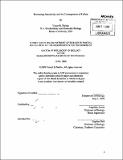| dc.contributor.advisor | Angelika Amon. | en_US |
| dc.contributor.author | Prabhu, Vineet R. (Vineet Ranjan) | en_US |
| dc.contributor.other | Massachusetts Institute of Technology. Dept. of Biology. | en_US |
| dc.date.accessioned | 2009-10-01T15:58:06Z | |
| dc.date.available | 2009-10-01T15:58:06Z | |
| dc.date.copyright | 2009 | en_US |
| dc.date.issued | 2009 | en_US |
| dc.identifier.uri | http://hdl.handle.net/1721.1/47882 | |
| dc.description | Thesis (Ph. D.)--Massachusetts Institute of Technology, Dept. of Biology, 2009. | en_US |
| dc.description | Includes bibliographical references. | en_US |
| dc.description.abstract | The maintenance and transmission of genetic material is critical for the survival of cells and organisms. Sexually reproducing diploid organisms undergo meiosis to produce haploid gametes, so that the resulting progeny are diploid. During meiosis I homologous chromosomes segregate to opposite poles, whereas sister chromatids segregate in meiosis II. A failure to segregate chromosomes correctly in either division results in offspring having an incorrect chromosome number: a condition called aneuploidy. Aneuploidy has been associated with several developmental defects and is a hallmark of cancer. Meiotic segregation errors are quite frequent in humans and are responsible for the 'maternal age effect.' This thesis addresses both the causes and consequences of aneuploidy. We first investigate the mechanisms that ensure faithful segregation of chromosomes during meiosis in the budding yeast Saccharomyces cerevisiae. The conserved Aurora B kinase is found to be responsible for detecting, and attempting to correct, incorrect kinetochore-microtubule attachments during both meiotic divisions. The meiosis I-specific protein Maml is found to link sister chromatids in a cohesin-independent manner, ensuring that they segregate together in meiosis I. In the presence of Maml, Aurora B can distinguish between sister chromatids and homologous chromosomes. Thus, Maml allows Aurora B to perform similar functions in both meiotic divisions, yet with profoundly different effects. | en_US |
| dc.description.abstract | (cont.) In the second part of the thesis, we examine the effects of aneuploidy on primary mouse cells by generating a series of cell lines that carry an extra copy of one of four mouse chromosomes. In all four trisomic lines proliferation was impaired and metabolic properties were altered. Immortalization, the acquisition of the ability to proliferate indefinitely, was also affected by the presence of an additional copy of certain chromosomes. Our data indicate that aneuploidy decreases not only organismal but also cellular fitness and elicits traits that are shared between different aneuploid cells. These findings may have ramifications for human disease. | en_US |
| dc.description.statementofresponsibility | by Vineet R. Prabhu. | en_US |
| dc.format.extent | 203 p. | en_US |
| dc.language.iso | eng | en_US |
| dc.publisher | Massachusetts Institute of Technology | en_US |
| dc.rights | M.I.T. theses are protected by
copyright. They may be viewed from this source for any purpose, but
reproduction or distribution in any format is prohibited without written
permission. See provided URL for inquiries about permission. | en_US |
| dc.rights.uri | http://dspace.mit.edu/handle/1721.1/7582 | en_US |
| dc.subject | Biology. | en_US |
| dc.title | Preventing aneuploidy and the consequences of failure | en_US |
| dc.type | Thesis | en_US |
| dc.description.degree | Ph.D. | en_US |
| dc.contributor.department | Massachusetts Institute of Technology. Department of Biology | |
| dc.identifier.oclc | 433106055 | en_US |
